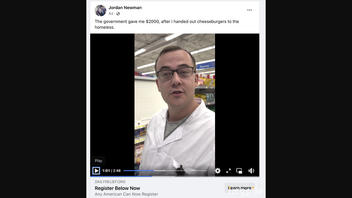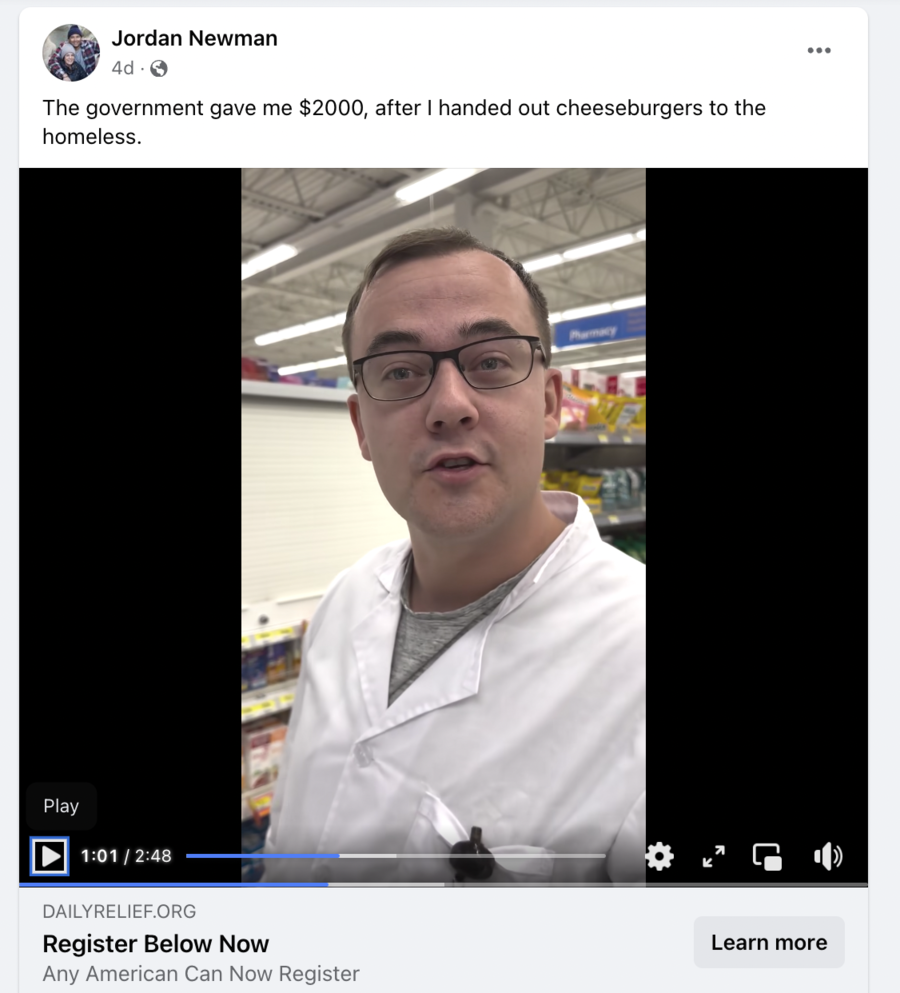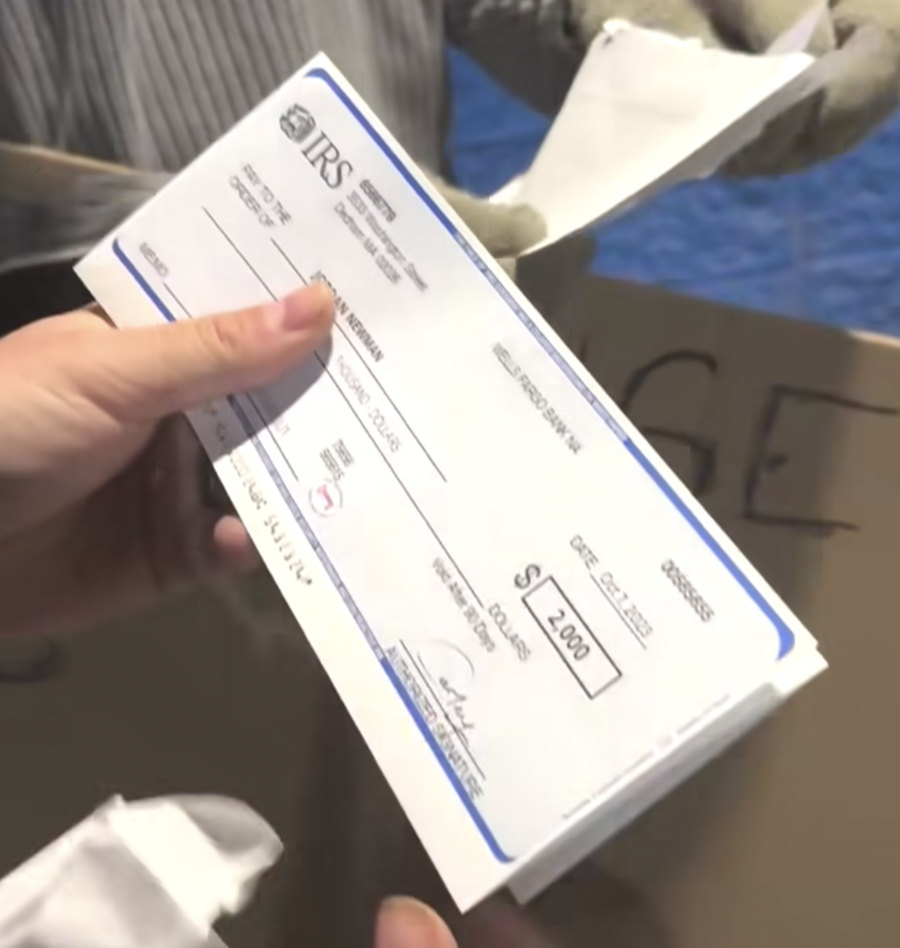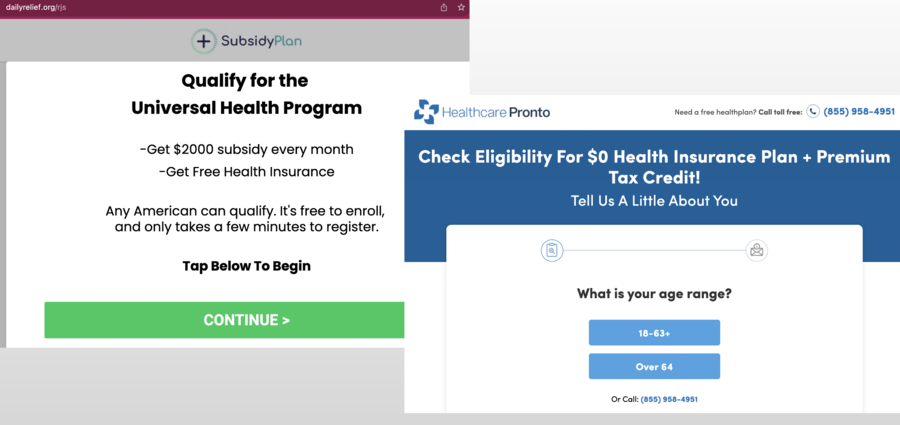
Does a "universal health program" give away $2,000 IRS checks each month to those who are enrolled in a "free health plan" that only requires a person's name? No, that's not true: The IRS told Lead Stories that such a promise is a scam. No credible resources had information about the purported incentive.
The claim originated in a post (archived here) on Facebook on October 21, 2023, under the caption:
The government gave me $2000, after I handed out cheeseburgers to the homeless.
This is what it looked like on Facebook at the time of writing:
(Source: Facebook screenshot taken on Wed Oct 25 15:24:13 2023 UTC)
The video has a male narrator who sets out to give away free cheeseburgers to the homeless. He gives a cheeseburger to an apparently homeless man outside a Walmart store and the man says he needs insulin but can't afford it. The narrator rushes into the store, finds a man in a white medical-style coat and explains he wants insulin for a person who can't afford it.
At the 1:01 mark in the video, the purported pharmacist says:
You're not gonna believe this but both of you are gonna be walking out with $2,000 ... There's this new program called the Universal Health Program. It gives you $2,000 every single month, as long as you're enrolled in a free health plan. So that free health plan is going to cover his insulin, too. All I need is your name and his name, and I'll print off those checks right now.
The "pharmacist" prints out what are purported to be two $2,000 checks with a logo on them saying IRS. The "pharmacist" instructs the narrator to register at a website to receive the money in the future.
(Source: Facebook screenshot taken on Wed Oct 25 14:54:50 2023 UTC)
The idea that a pharmacist at Walmart was able to print out government checks behind the register casts doubts on the authenticity of what is seen in the video.
An IRS spokesperson told Lead Stories via email on October 25, 2023:
The video is clearly part of a scam, notice how you never see the check clearly, and from what you can see they are clearly not Treasury checks, for instance, federal tax refund checks are issued by the Bureau of the Fiscal Service; for an example of a Treasury check, see: https://www.google.com/url?sa=
t&rct=j&q=&esrc=s&source=web& cd=&ved= 2ahUKEwiW5Meay5GCAxUBMVkFHUKiC 14QFnoECA8QAQ&url=https%3A%2F% 2Ffiscal.treasury.gov%2Ffiles% 2Freference-guidance%2Fgold- book%2Fcheck-security-poster. pdf&usg= AOvVaw0HcptZyboBkJS7hlmsI4Eb& opi=89978449 .
A Google search (saved here) for "$2000 universal health program a month" produces no relevant results.
Furthermore, enrollment in any health care plan typically requires more information than one's name: The address and Social Security number are usually required, too.
The video on Facebook came with a link that led to a series of websites presenting themselves as insurance companies looking to collect personal information:
(Source: DailyRelief.org screenshot taken on Wed Oct 25 14:47:42 2023 UTC; HealthcarePronto.com screenshot taken on Wed Oct 25 14:48:05 2023 UTC; composite image by Lead Stories)
The main page of the website that appears first (archived here), says it is not affiliated either with government agencies or the health care industry:
This page is an advertisement/advertorial. The story depicted here is for demonstration purposes only and everyone's results may vary. We hope you find our online resource informative and helpful. This site is in no way affiliated with any news source.
Other Lead Stories fact checks about heath care-related scams can be found here.















